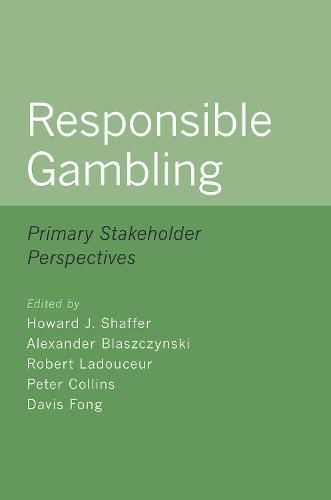Readings Newsletter
Become a Readings Member to make your shopping experience even easier.
Sign in or sign up for free!
You’re not far away from qualifying for FREE standard shipping within Australia
You’ve qualified for FREE standard shipping within Australia
The cart is loading…






Responsible gambling refers to a range of strategies, initiatives, and activities introduced by gambling regulators, policymakers, and industry operators to reduce gambling-related harms. There is an absence of agreement about the definition of responsible gambling among these parties, and stakeholders’ experiences reflect varied and often conflicting positions about the development, implementation, and maintenance of existing responsible gambling programs. Complicating these issues further, there is little empirical evidence supporting the current crop of responsible gambling activities. Consequently, there is a pressing need to bring together key similarities and differences associated with disparate stakeholder groups.
Responsible Gambling: Primary Stakeholder Perspectives will inform and better ground both current and future debates focused on the topic of responsible gambling and its intended outcomes. Chapters address responsible gambling from the perspective of five groups of complementary stakeholders: scientists/researchers; clinicians; gambling operators (casino, online, lottery, government); public policy makers/regulators; and recovering gamblers. Contributors drawn from these groups address responsible gambling through the lens of the Reno Model, an approach to responsible gambling that emphasizes the importance of stakeholders working together and using the science associated with evidence-based methods to reduce gambling related harms. Building upon and expanding the Reno Model and addressing conflicts and ethical compromises so that responsible gambling programs can achieve their intended objectives (reducing the worldwide rate of gambling-related harms), Responsible Gambling will be of value to a broad audience of scientists, clinicians, policy makers, regulators, and industry operators interested in the application and evaluation of responsible gambling strategies and activities.
$9.00 standard shipping within Australia
FREE standard shipping within Australia for orders over $100.00
Express & International shipping calculated at checkout
Responsible gambling refers to a range of strategies, initiatives, and activities introduced by gambling regulators, policymakers, and industry operators to reduce gambling-related harms. There is an absence of agreement about the definition of responsible gambling among these parties, and stakeholders’ experiences reflect varied and often conflicting positions about the development, implementation, and maintenance of existing responsible gambling programs. Complicating these issues further, there is little empirical evidence supporting the current crop of responsible gambling activities. Consequently, there is a pressing need to bring together key similarities and differences associated with disparate stakeholder groups.
Responsible Gambling: Primary Stakeholder Perspectives will inform and better ground both current and future debates focused on the topic of responsible gambling and its intended outcomes. Chapters address responsible gambling from the perspective of five groups of complementary stakeholders: scientists/researchers; clinicians; gambling operators (casino, online, lottery, government); public policy makers/regulators; and recovering gamblers. Contributors drawn from these groups address responsible gambling through the lens of the Reno Model, an approach to responsible gambling that emphasizes the importance of stakeholders working together and using the science associated with evidence-based methods to reduce gambling related harms. Building upon and expanding the Reno Model and addressing conflicts and ethical compromises so that responsible gambling programs can achieve their intended objectives (reducing the worldwide rate of gambling-related harms), Responsible Gambling will be of value to a broad audience of scientists, clinicians, policy makers, regulators, and industry operators interested in the application and evaluation of responsible gambling strategies and activities.